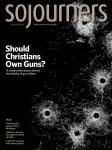AT 17, AS I SAT in a comprehensive health center in Namibia, a health care worker told my visiting religious group what the center really needed from outsiders to improve the care they offered. As a peer health educator at my high school, I entered the facility thinking I knew the universal cure for preventing HIV infection—education—and feeling sad that so many places in the world did not yet have access to the life-saving drugs because they could not afford them. I was naïve and incorrect on many fronts.
They had the drugs, the health worker told us, and they had a well-developed education plan both for prevention and antiretroviral therapy. What they really needed right then was baby formula, to prevent HIV-positive mothers from passing the virus on to their newborns. So the next time we wanted to donate to the organization, he said, please send formula or the money to purchase some, instead of knitted newborn hats or volunteers ready to paint the facility walls.
Susan R. Holman, in her book Beholden: Religion, Global Health, and Human Rights, provides valuable narrative, analysis, and information that can similarly open the eyes of religious leaders about helpful, sustainable, and respectful ways to approach health-related needs throughout the world. Unlike many global-health academics and activists, who simply dismiss religious efforts as destructive or limited, Holman asserts that religion must be incorporated into global-health initiatives “because faith matters to the large majority of people who are poor in this world.” Global-health initiatives cannot ignore the influence faith has on health, moral decision-making, and community structures.
Holman’s academic interests range from church history to nutrition, psychology to theology, and as a senior writer at the Global Health Education and Learning Incubator at Harvard University, she is a leading voice in calling attention to the “dazzling” potential of a cross-disciplinary approach to global health. This approach revolves around people of religious faith learning about human rights history, and human rights activists acknowledging the important role faith plays in what communities identify as health.
In one example, she introduces the southern African concept of ubuntu, which “views human community in an intersubjective interconnectedness.” Because of this “beholdenness” to one another, “‘perfect health’ requires action at both individual and community levels,” which is quite different than the personalized attention of Western medicine.
In recognition of her work on this important book, in April Holman will be presented with the 2016 Grawemeyer Award in Religion by the University of Louisville and Louisville Seminary. Award director Shannon Craigo-Snell describes Beholden as “theology at ground level,” and I would absolutely agree. Though academic in nature, Beholden provides an outline of what Holman describes as a “faith-based perspective with a global health lens [that] calls for a broad-scope awareness of a diversity of stories from across disciplines and communities.”
And though her book does not provide a “how-to” for religious leaders, she does emphasize the most important step in reorienting a lens of “mission” to one of global concern: listening first. Because there is vast diversity in faith and culture, “there is no one ‘right’ way to talk about how religion relates to health.” Rather than universalizing, Holman concludes that “Whatever we do, we must begin by learning from and listening to others around us who have far more and more deeply nuanced wisdom.” By listening first and establishing relationships, we can truly partner to benefit the health of all.

Got something to say about what you're reading? We value your feedback!

